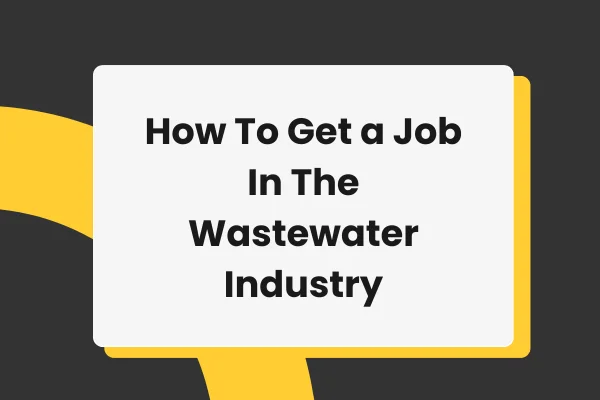
The wastewater sector in the UK offers diverse career opportunities for candidates with technical expertise, operational knowledge, and leadership ambition. With roles spanning treatment facilities, engineering consultancies, utilities, and environmental organisations, there are many routes to build a career in this area. This guide explores the types of jobs available, the skills employers look for, where to find vacancies, and how candidates can prepare for successful applications.
Overview of the UK Wastewater Industry
The UK wastewater industry supports the safe collection, treatment, and discharge of wastewater, ensuring compliance with environmental standards and public health requirements. The sector employs thousands of professionals across utilities, private operators, engineering firms, and environmental consultancies. Recruitment covers the entire treatment cycle, from process and project engineering to asset management, compliance monitoring, and senior leadership roles. Employers are seeking candidates who can manage technical systems, oversee large-scale operations, and deliver sustainable and efficient outcomes.
Key Role Categories and Entry Points
There are several job categories within the wastewater industry, each offering distinct career paths.
Process and project engineering roles are central to delivering capital projects. Engineers are involved in designing treatment systems, developing new infrastructure, and managing projects from concept to completion. These positions often require degrees in civil, environmental, or chemical engineering, along with professional accreditations.
Plant and operations management roles focus on the day-to-day running of treatment facilities. Operational managers oversee plant performance, supervise staff, and ensure that systems meet quality and safety standards. Experience in plant operations, maintenance, and compliance is often essential for progression in this field.
Water quality and compliance positions ensure that treatment outcomes meet UK and EU standards. Professionals in this area are responsible for sampling, laboratory testing, and preparing reports for regulators. A scientific background is often needed, with knowledge of water chemistry and environmental science.
Asset management and infrastructure positions involve overseeing the lifecycle of treatment facilities and networks. These roles require skills in maintenance planning, risk management, and reliability engineering. Employers value candidates who can balance operational needs with long-term infrastructure planning.
Environmental and sustainability leadership roles are becoming more significant as organisations focus on reducing environmental impact and achieving net-zero targets. These positions involve creating strategies for resource recovery, renewable energy use, and sustainability reporting. Candidates with expertise in environmental policy and management are particularly well-suited to these roles.
Executive and board-level appointments involve leading organisations and shaping strategy. Leaders are expected to have a strong understanding of industry challenges, commercial pressures, and regulatory requirements. Experience in managing large teams, budgets, and stakeholder relationships is critical for these positions.
Where to Look for Jobs
Candidates searching for wastewater roles in the UK have several routes available. Working with specialist recruiters is one of the most effective approaches. Recruitment firms such as Mackinnon Bruce use executive search, market mapping, salary benchmarking, and succession planning to connect candidates with suitable positions across the industry.
Direct applications to water utilities and private operators can also be effective. Large utilities such as Thames Water, Severn Trent, and United Utilities advertise a wide range of engineering, operational, and managerial positions. Engineering consultancies and contractors also list vacancies on their own websites.
Government and public sector opportunities can be found through the Water Services Regulation Authority (Ofwat), the Environment Agency, and local authorities. These organisations regularly advertise roles connected to regulation, compliance, and environmental management.
Networking is another important tool. Industry events, career fairs, and professional bodies such as the Chartered Institution of Water and Environmental Management (CIWEM) often host career opportunities and provide access to industry contacts.
What to Expect: Recruitment Process and Employer Needs
The recruitment process for wastewater roles varies depending on the level of the position. For technical roles, candidates can expect competency-based interviews that focus on problem-solving, regulatory knowledge, and technical expertise. For operational and leadership roles, assessment may include case studies, presentations, or behavioural interviews designed to evaluate management skills and cultural fit.
Employers are looking for candidates who combine technical knowledge with an understanding of regulatory frameworks, sustainability practices, and digital systems. For senior positions, strategic thinking and the ability to drive change within organisations are highly valued. Recruiters often take a consultative approach, ensuring candidates are aligned with both the technical requirements and the long-term goals of the employer.
Skills and Qualifications to Highlight
Candidates applying for wastewater jobs should focus on highlighting key qualifications and skills. Engineering backgrounds in civil, environmental, or process disciplines are highly sought after, especially when paired with professional memberships such as Chartered Engineer (CEng) status.
Operational expertise is also critical. Experience in plant management, asset reliability, and compliance frameworks is valuable for employers running treatment facilities. Candidates with knowledge of water chemistry, microbiology, and laboratory analysis are well-positioned for water quality roles.
Digital skills are becoming increasingly important. Many organisations are adopting advanced SCADA systems, IoT applications, and data analytics tools to optimise plant performance. Candidates with digital competencies can stand out in a competitive market.
Leadership abilities are essential for candidates aspiring to management and executive positions. Skills in stakeholder engagement, financial management, and strategic planning are often key selection criteria. Sustainability knowledge and awareness of environmental regulations are also advantageous across all role types.
Career Progression in the UK Wastewater Sector
The wastewater industry offers clear career progression opportunities. Entry-level positions may include graduate engineering schemes, operational apprenticeships, or laboratory technician roles. These provide hands-on experience and training in industry standards.
Mid-level positions often involve supervision or management responsibilities. Candidates may move into roles such as process engineer, compliance officer, or operations supervisor. These positions require proven technical ability and the ability to manage teams or projects.
At senior levels, candidates may progress to department heads, plant managers, or strategic roles within utilities and consultancies. Leadership at this level requires a combination of industry knowledge, managerial expertise, and the ability to influence stakeholders.
For those seeking executive positions, opportunities exist in both utilities and private companies. Board-level roles require commercial understanding, vision, and the ability to lead large organisations through regulatory and operational challenges.
Practical Advice for Applicants
Candidates aiming to secure roles in the wastewater industry should tailor their applications carefully. A strong CV should highlight technical competencies, compliance experience, and digital expertise. Cover letters should demonstrate an understanding of the organisation’s priorities and the broader context of the UK water sector.
Networking is a practical way to access opportunities. Attending industry events, connecting with professionals through LinkedIn, and joining professional bodies can increase visibility in the sector. Working with a specialist recruiter also provides candidates with access to roles that may not be publicly advertised.
It is important for candidates to keep up to date with regulatory changes, sustainability initiatives, and technological developments in the industry. Awareness of these trends can help candidates demonstrate commitment and relevance during interviews.
The UK wastewater industry provides a wide range of career opportunities, from technical engineering and plant operations to leadership and executive management. Candidates who combine technical knowledge, regulatory awareness, and digital skills are in high demand across the sector. By exploring the full range of job categories, understanding recruitment processes, and preparing targeted applications, professionals can build rewarding careers in wastewater treatment and management. For those ready to take the next step, working with specialist recruiters and industry networks can provide valuable support in finding the right role.




